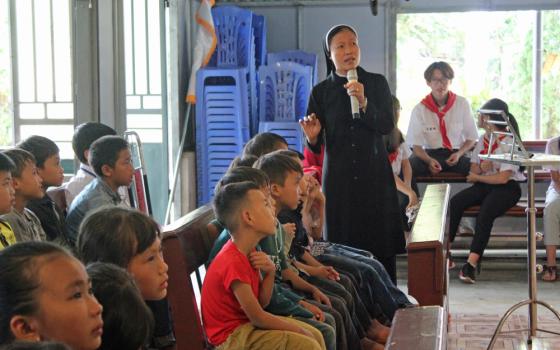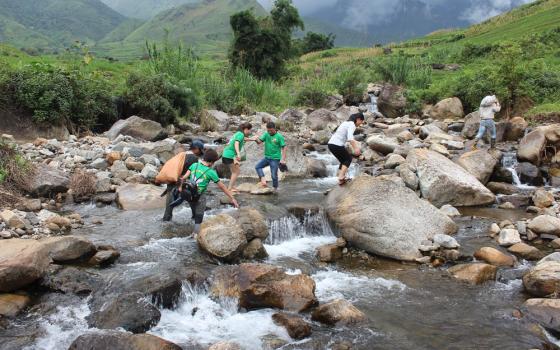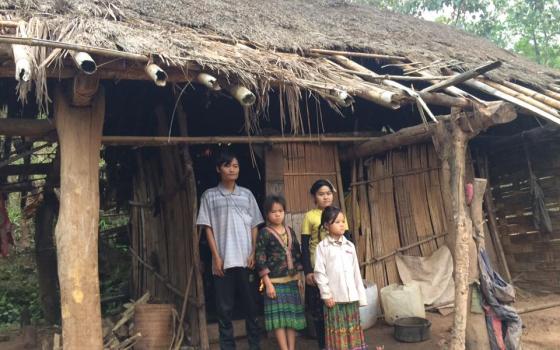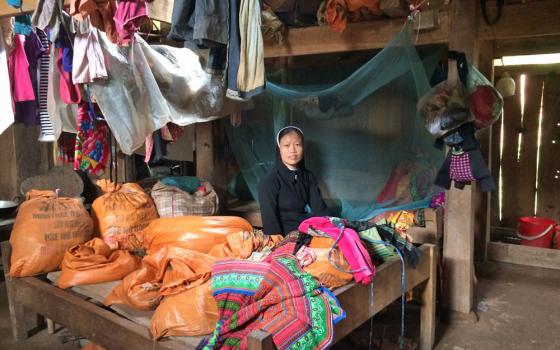Religious activities have not been recognized for decades by government authorities in Vietnam's northwestern mountainous provinces of Lao Cai, Lai Chau and Dien Bien that are bordered by China.
These provinces are home to multiple ethnic minority groups, including the Tay, Thai, Hmong and Dao. Authorities, considering the provinces to be without religion, regularly prevent priests and nuns from outside the region from visiting and working with local people, especially those who belong to ethnic groups.
The people live in extreme poverty and gather vegetables, insects and animals in the forests for daily food. They have no access to education and health care services, and their large families often suffer malnutrition due to lack of food.
For the last decade, nuns from the Lovers of the Holy Cross of Hung Hoa have quietly built and served many Catholic communities in those provinces. They have helped hundreds of people embrace Catholicism, putting themselves at risk with the government. In the last few years, people have practiced their faith more openly and have requested acknowledgement of their freedom to worship. Some Catholic communities have been granted government recognition.
The congregation serves Hung Hoa Diocese, which covers part of Hanoi City and nine northern provinces.
One of the nuns, Sr. Maria Do Thi Quyen, 43, who serves as head of the three-member community based in Lai Chau Parish, recently talked with GSR about their evangelization work, challenges and achievements.
GSR: Please tell me how you have pursued missionary work in the provinces.
Quyen: We were sent to serve Sapa Parish, based in Lao Cai Province, for the first time in 2009. The parish is home to Hmong Catholics who had no resident priests for decades. We held catechism classes for them at the church and even in their houses. We conducted choirs and taught them how to pray, dance and offer flowers to God and saints in religious festivals.
We worked with Catholics in Dien Bien Province from 2012 to 2016. At that time, they did not dare practice faith publicly, for fear of government punishment. We quietly visited, taught catechism and encouraged them to bravely live out their faith. Two parishes of Dien Bien and Muong Nhe, with a total 2,200 Catholics, are recognized by the provincial government.
Two sisters and I now serve 15 subparishes and mission stations based in Lai Chau Province. Those communities, each with 100 to 300 people, total 2,300 Catholics, including 600 ethnic Hmong. Only one community is recognized by the local government.
In the last 10 years, we have helped some 500 people, mostly Hmong, be baptized.
What problems do you face from the government?
One big problem is that local authorities prevent missionaries and strangers from entering Hmong ethnic villages. Their reason is that they have to ensure security at the villages. Villagers are also banned from gathering for prayer.
We pay short visits to villages by dressing in the local style and pretending to be traders or visitors.
We select usually two young people from each village who are literate and smart, and train them at local parishes as catechists. Later the young people hold catechism classes and teach villagers how to sing hymns and dance in their own villages, where authorities cannot restrict them.
It is easier for us to visit villages where religious activities are regularly organized.
Many times, while we are visiting and giving food to villagers in Dien Bien Province, we are found out and expelled from villages at night. We have to ask villagers to carry us on motorbikes back to our base, hundreds of kilometers away.
We live in a house near Lai Chau Parish House. We bought the house in 2013 from a local Catholic family, but we have not yet been recognized as a convent by the government. We also raise chickens and cultivate vegetables around the house for a living.
We have spent weeks staying at people's houses to work with them to prepare for Christmas, Easter and other feasts.
How do you travel to villages?
Our base is from 30 to 350 kilometers [19 to 217 miles] away from Catholic communities in the mountainous provinces. We travel by bus, by motorbike and on foot. We often walk from 5 to 20 kilometers (3 to 12 miles) to villages. I walk so much that my feet become bigger [she smiles]. We get carsick while traveling on mountainous roads, foot injuries from walking and suffer overall exhaustion.
Some sisters get sick and have to leave for other places after working only a few months or years because of the harsh weather.
I thank God for giving me good health and enthusiasm to do evangelization work here for the past 10 years.
How do villagers live?
We are heartbroken to see Hmong villagers live in extreme poverty. Many families with 10 members live in 20-square-meter (215-square-feet) shabby houses made by bamboo and wood. They have only old saucepans for cooking on fire.
Children under 10 are dirty and have to go naked because they rarely bathe and have no clothes. Their parents leave them at home while they work all day on farms and in the forests. They return home in the evening and cook a dinner of corn, vegetables and also mice, snakes and birds they catch in the forests.
An average family has five to seven children and some have as many as 10. Children have no access to education because the villages have few schools.
Hmong people lead a simple life and rarely complain about their living conditions.
We ask for money, clothes and food from benefactors and offer them to the villagers. We erect proper shelters for elderly people and the sick.
We also teach young people, especially women, living skills, food preparation and personal hygiene so that they can take care of their families.
What is your experience in evangelization?
First, we try to adapt ourselves to the local situations. We integrate ourselves into villagers' lifestyles. They offer us foods we have never eaten, such as insects and mice. We sit on the ground in their houses and use our hands to eat vegetables, corn or rice with chili and water. We share the same bowls with them.
We sleep on wooden planks full of clothes, which are seldom washed. Villagers have no toilets in their houses and relieve themselves in the open air and in forests. We have no choice but to follow their customs.
Doing evangelization here means you must trust in God and let him lead you to places he wants, bravely overcome challenges and, especially, love the villagers.
Second, we train young people as catechists and lay leaders so that they can work with their villagers. They practice faith at their villages and protect us from dangers and government problems.
We are proud to lay the first foundations in these areas so that local clergy later may come to give pastoral care.
The diocese sets up a hostel for 50 students to go to public schools in Dien Bien Province. We hope to open other hostels in other places in the future.




